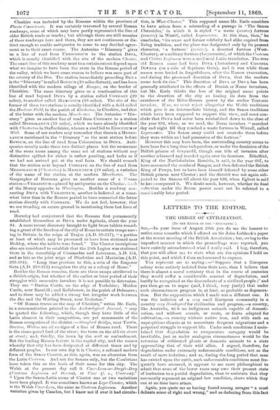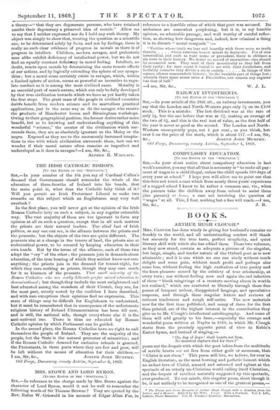LETTERS TO THE EDITOR.
THE ORIGIN OF CIVILIZATION.
[To THE EDITOR OF THE "SPECTATOR:] SIR,—In your issue of August 28th you do me the honour to notice some iemarks which I offered on Sir John Lubbock's paper at the recent meeting of the British Association ; but, owing to the imperfect manner in which the proceedings were reported, you have entirely misuuderstoad what I really said. I beg, therefore, that you will allow me to state what are the opinions I hold on this point, and which I then endeavoured to express.
You represent me as saying :—" Suppose that a European colony were entirely isolated from their race, then I believe that there is almost a moral certainty that in the course of centuries they would suffer a considerable amount of degradation, and hardly be recognized as the descendants of a civilized people ;" and you then go on to argue (and, I think, very justly) that under such circumstances progress is, at least, as probable as degenera- tion. But the supposition which I made was a different one. It was the isolation of a very small European community in a country very ill-adapted for civilization and progress,—a country, like Australia, will no indigenous animals capable of domesti- cation, and without cereals, or roots, or fruits adapted for cultivation, —a country without native iron, and with such an unpropitious climate as to necessitate frequent migrations and a perpetual struggle to support life. Under such conditions I main- tained that degradation to comparative savagery would be inevitable, just as under analogous circumstances would be the reversion of cultivated plants or domestic animals to a state approaching that of their wild allies. I argued, therefore, for degradation under extremely unfavourable conditions, not as the result of mere isolation; and as, during the long period that man has existed upon the earth, such unfavourable conditions must fre- quently have occurred, it appears to me more philosophical to admit that sonic of the lower races may owe their present state of barbarism to a partial degradation, than to maintain that they necessarily represent an original low condition, above which they can at no time have arisen.
Again, you quote me as having found among savages "a most delicate sense of right and wrong," and as deducing from this fact
a theory—" that they are degenerate persons, who have retained amidst their degeneracy a primeval idea of morals." Allow me to say that I neither expressed nor do I hold any such theory. My object was simply to show that, treating the question as a scientific one, to be determined solely by facts, and not by feelings, there is really no such clear evidence of progress in morals as there is of progress in intellect. Children, modern savages, and prehistoric man alike exhibit deficiency of intellectual power, but we do not find an equally constant deficisttcy in moral feeling. Intellect, no doubt, reacts upon morals by determining the more remote effects of our actions, and by logically extending the sphere of our sympa- thies; but a moral sense certainly exists in savages, which, within a limited sphere of action, seems as powerful an incentive to regu- late conduct as it is among the most civilized races. Morality is an essential part of man's nature, which can only be fully developed by that true civilization towards which we have as yet hardly taken the first steps. The great mass of the people in civilized countries deri4 benefit from modern science and its marvellous practical applications, just in the same way as do the savages who receive the products of Manchester looms and Birmingham workshops. Owing to their geographical position, the former derive rather more benefit, but as to knowing and understanding anything of this wonderful "science," the creator of the civilization which sur- rounds them, they are as absolutely ignorant as the Malay or the negro. Exposed as they are to the enormously increased tempta- tions to vice with which civilization surrounds them, how can we wonder if their moral nature often remains as imperfect and undeveloped as it does in savages ?—I am, Sir, &c.,
ALFRED R. WALLACE.































 Previous page
Previous page